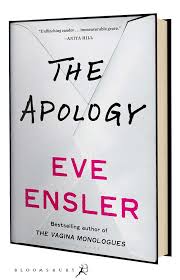THE APOLOGY, a review

THE APOLOGY
Eve Ensler
Of course it’s triggering, but just know this and read however you need to, maybe in small bites, maybe between walks at the ocean, or talks with your therapist, but consider the nature of what it means to formulate an apology from the abuser who never would do that in real life. My father refused. Maybe yours also refused…wouldn’t even have the conversation.
Considering what it would mean; knowing my father refused, I peeked in Eve Ensler’s book, The Apology. Then I peeked again. And again. There are differences, to be sure, in her story, her father’s story, and mine, and yet some of her words have also been written by me, said by me; and I can’t be the only other one out here.
I still need to re-read what I may have skimmed. Soaking up her father’s persona was more painful and more extended than I could tolerate on first reading. Ensler goes deeply into her father’s psychological makeup, where I simply unearthed the facts of my father’s childhood, not so much his deep emptiness. His chronic depression and his alcoholism were just genetic traits as far as I was concerned, as far as I was willing to look. Naturally, there was more to it.
The large glaring truth of never having known unconditional love, of being so woefully ignorant of how to accept his little girl’s open, total trust—this was Dad. He betrayed that trust earlier than Eve’s father, when I was three, more when I was four, until the age of seven. I was his ‘special girl.’ He was always clear about the ‘special.’
The gift for me in Ensler’s work is to finally know I was not to blame for being ‘special.’ After nearly twenty years of therapy and the integration of highly protective dissociative alters that were formed in response to that childhood trauma, this is the first time I clearly see I was not to blame—that it was beyond my father’s capability to cope with the pure innocence of my child’s freely offered unconditional adoration and total trust.
When my dad died, I said that I knew what my father had taken from me—trust in others and belief in myself. My developing self had been destroyed when I split into separate parts to survive. I was still wary of my fragments, only beginning to realize they were the best of me, that I had lived my whole life with no knowledge of the purest, truest parts of myself. My father took that from me. I was a different person because of him. I might not have run away from home at sixteen, my life trajectory might have been more promising—he had broken me and I was only then putting the pieces of my brittle self back together. I might have known I was bright, not stupid; capable, not inept; strong, not weak; lovable, not hopelessly cold and cut-off from warmth. The word “birthright” entered my mind, and I let it die there. Our friends made shiva calls to my home, and I let them think I was crying for my father’s death. Only I knew differently and I couldn’t say my shame out loud. There was a whole life I didn’t have because of my father, a whole person I didn’t become because of his secret touching, a life stolen away.
In contrast, the end of Ensler’s The Apology is genius. His litany of confessions reads like the chest thumping Al Chets we confess on Yom Kippur, standing in stark distinction to my own accusations of my father:
- What kind of destruction have I wrought? I have lied and lied to myself and to you.
- I cursed your future of love. At five I took your body. You didn’t give it to me.
- I contaminated your sweetness.
- I ripped the protective golden gates from your garden.
- I betrayed your trust.
- I rearranged your sexual chemistry and the basis of your desire.
- Wrongness and excitement were forever fused together.
- I made my stain. I left my stinking mark.
- By invading and overwhelming your body I killed your yearning so early.
- You did not give me permission. There was no consent.
- You did not seduce me with your crinoline petticoats. You were simply being an adorable child…
- I robbed you of agency over your body.
- You didn’t make any decisions. You didn’t say yes. You had no sovereignty.
- I exploited and abused you.
- I took your body. It was no longer yours. I rendered you passive…
- I forced you out of your body, and because you were dislocated and numb, you were unable to protect yourself.
- I compromised your safety and ability to defend yourself…
- I exploited your adoration…
- I made intimacy claustrophobic…
- I stole your innocence…
Her entire last page, his paragraphs of sorrow, drop me to the ground.
Would it be so.
Thank you, Eve.
(THE APOLOGY EVE ENSLER Bloomsbury Publishing, Inc. 2019)